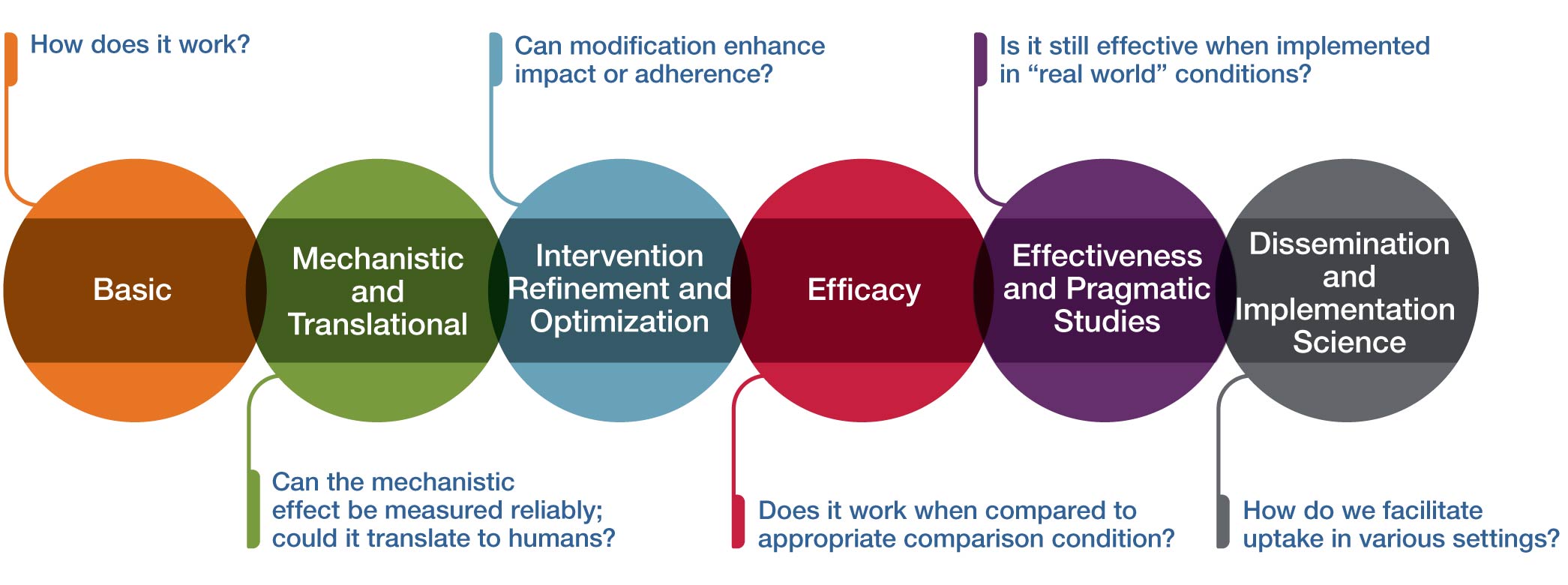Mind and Body Research—Information for Researchers

Definition
As the field of complementary and integrative health expands and the line between conventional and complementary approaches blurs, the National Center for Complementary and Integrative Health (NCCIH) has recategorized the approaches that fall within our research mission based on their primary therapeutic input; two of these therapeutic inputs are psychological interventions and physical interventions (often called mind and body interventions). This categorization illustrates where boundaries partially overlap. For example, mind and body practices, such as mindfulness-based stress reduction, can overlap with more conventional practices such as psychotherapy. Cognitive behavioral therapy increasingly incorporates relaxation, meditation, and other modalities. Many of the mind and body therapies, such as yoga, tai chi, and acupuncture, have both physical and psychological components.
Research on these physical and psychological practices encompasses a wide variety of interventions that are based in procedures or techniques administered or taught to others by a trained practitioner or teacher. From a research perspective, these interventions, practices, and disciplines all share certain characteristics that create similar challenges in designing rigorous and definitive clinical investigations of their benefit and safety. For example, (1) it is generally difficult or impossible to mask practitioners and/or participants involved in physical and psychological clinical research, (2) claims about benefit often relate to subjective or patient-reported clinical outcomes, (3) in practice, the interventions are often individualized, or involve complicated procedures that are difficult to systematize or characterize fully, and (4) means to objectively measure the impact of the interventions on important biological processes are frequently inadequate.
Research Priorities
Although many mind and body interventions are widely used or offered by practitioners, strong evidence about whether they are safe and offer clinical benefit for specific medical conditions or symptoms is often lacking. To improve the rigor of clinical research on these approaches, it is useful to have insight into their biological effects and the mechanisms of action by which they impact physiology. The NCCIH strategic plan emphasizes fundamental research to advance understanding of the mechanisms through which physical and psychological approaches affect health promotion and restoration, resilience, disease prevention, and symptom management. The research strategies described in the plan also include clinical studies evaluating the potential roles of physical and psychological approaches in promotion of whole person health, health restoration, resilience, enhancement of adherence to medical treatments, and prevention or treatment of symptoms (e.g., sleep disorders, depression, anxiety, obesity, and pain conditions). The plan also includes priorities on the development of novel technologies and instruments, including diagnostic methods, tools, and sensors, to facilitate rigorous research on their effects.
Emerging evidence of promising clinical effects of many physical and psychological approaches points toward important opportunities to advance the science and practice of symptom management and health promotion. In many cases the evidence is strengthened by an intriguing and growing body of basic and clinical research employing the tools and technologies developed in the fields of neuroscience, psychoneuroimmunology, psychology, behavioral medicine, physical medicine, and biomechanics. Addressing the scientific and operational challenges confronting the study of promising psychological and physical interventions requires continued efforts to foster multidisciplinary collaboration aimed at engaging the expertise and experience of complementary and integrative medicine practitioners and using the tools and technologies of a wide variety of scientific disciplines.
Developing insight into biological and physiological effects and mechanisms of action of physical and psychological interventions is critically important in developing translational research tools to design and execute maximally informative clinical research. It is a crucial component of the scientific evidence base guiding clinical practice and public use and has the potential to inform other fields of biomedical research.
Rigorous study of all clinical interventions requires the use of well-established methodology. Large clinical studies are an essential component of the evidence base establishing clinical efficacy or effectiveness. To implement such studies, the magnitude and nature of treatment effects must be estimated based on clinically meaningful effects, treatment algorithms must be developed and validated, and feasibility of accrual must be established. Methods need to be in place to measure consistency and fidelity of protocol implementation, practitioner variability, and adherence of participants to the regimens being studied. In addition, well-characterized and meaningful clinical and laboratory outcome measures are needed to fully determine safety and to definitively measure benefit or lack thereof.
NCCIH Funding Opportunities
NCCIH issues specific funding announcements for narrow areas of high priority. However, we will accept mind and body research applications through a number of investigator-initiated grant mechanisms. These include NCCIH’s suite of mind and body intervention funding opportunities (R34, R01, and UG3/UH3 with the companion U24) and standard National Institutes of Health funding opportunities (parent R01 and R21 announcements, the omnibus Small Business Innovation Research (SBIR) (R43/R44) and Small Business Technology Transfer (STTR) (R41/R42) announcements, and the various training mechanisms including fellowships (F), mentored training (K), and institutional training (T).
- View all active funding opportunity announcements (FOAs)
Past NCCIH Research
- Research spotlights—Review these selected summaries of published NCCIH research.
NCCIH Contact Information
You may find it helpful to discuss your proposed research with an NCCIH staff member prior to submitting a grant application. Each program staff member is responsible for coordinating scientific research portfolios in various scientific areas.
Review scientific portfolio areas and contact an NCCIH Program Director.
If you have general questions about NCCIH’s physical and psychological research funding, please contact:
